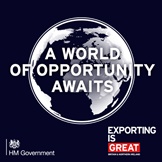
Every communication touch point you have with your international buyers (and other stakeholders involved in your business development and sales process) conveys an impression about your brand.
Your website is your shop window to the world. It's important that you can be found via the search engines used in international markets and that your website tells a story that engages with your international buyers.
There are many factors to think about when it comes to ensure your website is visible internationally. Here are just some of the main considerations which can be relatively easily addressed:
Secure a .com
A .com website will give you more credibility and international website optimisation than a .co.uk. If the .com for your company name is not available you may have to think creatively about using your company, brand or keyword name and find a close equivalent that will help you to be found. You could also secure generic top level domain names such as .eu.
International phone numbers
Ensure you have an international phone number shown prominently in the header of your website e.g. + 44 (0)+ your number. You may wish to have phone numbers localised to your markets. There are various ways of doing this through, for example, virtual telecommunications services or Voice Over Internet Protocol (VOIP) service.
Use plain English
It's important that your message is as clear as possible. Use plain English, avoid using idioms and colloquial language as this can confuse your audiences. It's also important that your English text is as clear as possible before any translation into other languages takes place.
Language pages
Having your website pages and keywords professionally translated into key target languages for priority markets can make a difference to your website optimisation and brand credibility. Do not rely on automated translation. Identifying the language(s) to translate into and selecting and working with translators can be assisted by a UKTI Language and Culture Adviser (if your company is based in England and exporting).
Metadata considerations
There are many factors to consider to ensure that browsers and search engines used by potential new customers can easily find you. This includes, for example, ensuring the correct language tags are used and keywords have been professionally translated by a native speaker of the target languages(s). Optimisation needs to take place by addressing several areas of your website including the content (text, images ,video etc, the URL file name, image, header and title names).
Imagery, branding and localisation
Are the images you use in your website culturally appropriate? Things to bear in mind include:
- Images of alcohol, certain foods and animals are not appropriate in certain markets
- Ensure pictures of people shown in the context of use of your products or services look like people you in your target markets (ethnic type, skin tone, clothing etc)
- Imagery should also reflect the local environment, architecture, vehicles (makes of car, left or right hand drive, number plates etc), weather, climate, food and drink, and attitudes to gender and religion according to conventions used in the market.
Social media links and marketing
Social media campaigns can be a good way of generating new business depending on the types of products and services you sell and cultural attitudes to social media. Bear in mind that different social media platforms to those that are used in the UK are used in other countries e.g. Xing is more popular than LinkedIn in Germany and some countries e.g. China have restricted access to certain social media platforms.
Help with online communications
There are many other factors to consider with regard to online marketing and you may wish to discuss having a detailed review of your website or other marketing media with a UKTI Adviser. If you require help from someone with language and skills and cultural knowledge to assist with export communications you could consider bringing in a student or graduate with these skills as part of the Postgraduates for International Business scheme, which you can discuss with your Language & Culture Adviser. UKTI’s Digital Advisers can also assist with your website and e-commerce.
What next?
Developing understanding about the nuances of culture and how to respond to them through your marketing and communications will help your international business to flourish.
For further information about language and culture services, companies in the North West can contact me at sara.knowles@uktinorthwest.co.uk Companies in the rest of the UK can find their local UKTI language and culture adviser by contacting your local UKTI office

You can find global export opportunities on the Exporting is GREAT website. Visit the site for export leads, practical support and inspiration for UK companies who want to grow their business through export
